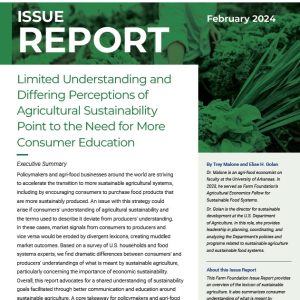Blog
Limited Understanding and Differing Perceptions of Agricultural Sustainability Point to the Need for More Consumer Education
This is an excerpt of the Farm Foundation Issue Report, Limited Understanding and Differing Perceptions of Agricultural Sustainability Point to the Need for More Consumer Education. The full Issue Report, written by Trey Malone and Elise H. Golan, provides an overview of the lexicon of sustainable agriculture. It also summarizes consumer understanding of what is meant by sustainable agriculture.
Executive Summary
Policymakers and agri-food businesses around the world are striving to accelerate the transition to more sustainable agricultural systems, including by encouraging consumers to purchase food products that
are more sustainably produced. An issue with this strategy could arise if consumers’ understanding of agricultural sustainability and the terms used to describe it deviate from producers’ understanding. In these cases, market signals from consumers to producers and vice versa would be eroded by divergent lexicons, creating muddled market outcomes. Based on a survey of U.S. households and food systems experts, we find dramatic differences between consumers’ and producers’ understandings of what is meant by sustainable agriculture, particularly concerning the importance of economic sustainability. Overall, this report advocates for a shared understanding of sustainability goals facilitated through better communication and education around sustainable agriculture. A core takeaway for policymakers and agri-food businesses is the need for more consumer education about sustainable agriculture to make market approaches work.
Policymakers and agri-food businesses worldwide are striving to accelerate the transition to more sustainable agricultural production. They have a range of tools to achieve this, such as incentive programs, environmental-use laws, and R&D. Increasingly, policymakers are turning to consumer demand as a tool to stimulate more sustainable agricultural production. The premise behind this approach is that
increased demand for sustainably produced products, particularly when such demand includes a willingness to pay higher prices, could grow markets for these products and incentivize farmers to expand the use of sustainable production practices. This approach only works, however, if consumers’ understanding of agricultural sustainability, and the terms used to describe it, is similar to policymakers’ and producers’ understandings. If not, market outcomes would fail to reflect consumer choice, eroding both market stability and producers’ incentives to adopt more sustainable production practices.
In this paper, we explore consumer and producer perceptions of sustainable agriculture. We start with an overview of the official United Nations and U.S. government usage of the terms “sustainable development” and sustainable agriculture. We note the importance these official usages place on a holistic approach to sustainability that balances three dimensions of development: economic, social, and environmental. We then present the results of a survey of industry experts/producers and U.S. consumers exploring their perceptions of sustainable agriculture. Results reveal overall positive perceptions of the concept of sustainable agriculture but variation between the two groups with respect to the importance of economic sustainability and differences in the interpretation of the lexicon describing different sustainability production approaches. We then examine the ramifications of these findings for policies that seek to leverage consumer-driven market demand to stimulate more expansion of sustainable agricultural production. Our analysis highlights the need for sustainable agriculture policy and marketing strategies to consider the perspectives of all stakeholders and provide targeted education and outreach.

